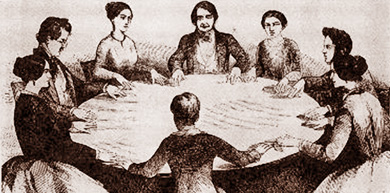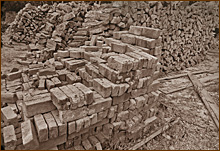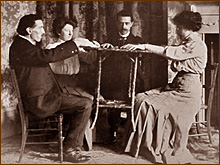THE RISE AND FALL OF ANCORA'S SPIRITUALISTS
A Utopian Commune That Spoke With The Dead
By Sandy Levins ... | ...May 31, 2011

19th-century spiritualists who used séances to commune with the dead established a utopian community deep in the pines at Ancora.
ANCORA, N.J. -- This unincorporated section of Camden County best known for the state psychiatric hospital that bears its name is also notorious for urban legends about disembodied spirits.
Some of that spooky lore is related to the ghost-laced folk tales of the Jersey Pines and some is a direct result of wild exaggerations that are a staple of many websites. But perhaps the most egregious online fabrication concerns Veterans Haven, a local state facility that services homeless New Jersey veterans.
Abandoned village
A number of web authors have taken distorted versions of stories about a now-demolished woodland housing tract and mixed them up with the idea that "Veterans Haven" was home to a collection of mentally deranged veterans killed each other off, leaving a creepy abandoned village crackling with paranormal activity and frequented by ghost hunters.
Great stuff for scary campfire stories, but totally at odds with historical fact or contemporary reality.
Although it has nothing to do with Veterans Haven, Ancora actually DOES have a long association with disembodied spirits of another sort. Seventy years before it became famous as the site

Illustration: HistoricCamCo
|
| The spiritualist commune planned to manufacture bricks from local clay along with making baskets, barrel, boxes and other pine-forest products. Larger |
of the psychiatric hospital in 1955, it was home to a 19th-century Spiritualist sect of about 25 families that established a model community in what was then a wild and remote location. Back then, spiritualism -- the belief that the living could directly communicate with, and learn from, the dead -- was both a serious religious movement and a popular entertainment in middle-class America.
Much like fortune tellers, "mediums" collected fees for hosting séances at which they communicated with a client's dead relative.
Religious spiritualism
The religious version of spiritualism, on the other hand, was a bit more serious, believing that the world of departed souls was actively engaged in helping improve individual lives of mortal humans. Various sects created entire philosophies and societal principles based on these beliefs. And, following another trend of the period, some led their followers to remote locations where they hoped to create self-sustaining utopian communities insulated from the evils of non-spiritualist society.
In 1866, one proponent of the supernatural, Dr. George Haskell and a group of like-mined back-to-nature spritualists, purchased 4,000 heavily-wooded acres in Winslow Township, including land now occupied by the psychiatric hospital. After his death in 1876, Haskell's followers continued his work.
They hoped to establish a commune organized around an industrial college where young men

Photo: Nottingham
|
| Spiritualist mediums charged fees for communing with the dead, often with a number of tricks thrown in. Here, an 1880s' medium levitates a table. Larger |
and women would be schooled in agriculture, horticulture, manufacturing, mechanics and the arts. He and his spiritualist followers hoped to demonstrate the economic and labor-saving aspects of group living at the same time they maintained a chaste close-quarters environment and the monogomous sanctity of marriage. The overall plan was for most of the residents to support themselves by manufacturing shoes and baskets; kegs, barrels and boxes; earthenware and bricks; clothing and pocketbooks. Meanwhile, the "gifted" among them would make their living as clairvoyants and practicing mediums, facilitating communication with spirits of the dead.
Ultimately, dissention split the community. Some questioned the true purpose of the enterprise; others were disillusioned by their experience. Ultimately, they all abandoned the Pinelands commune and moved away.
Though we may never know what really happened to Ancora's Spiritualists, perserved handwritten letters* provide tantalizing hints. For instance, one author wrote, "I wonder after all what demon ever possessed you to go there." Another letter reads, "I see very little to encourage me in regard to the future of that unfortunate place." And this from a third letter, "...it must be that you no longer hold open intercourse with disembodied spirits -- for all who do seem lured on by them to ruin. Poor Anchora [sic]! Of its interior life I have no present knowledge... too late to retrieve our fortunes, but not altogether perhaps for the recovery of reason and health."
* Quoted letters from "Milo Townsend and Social Movements of the 19th Century," by Charles and Peggy J. Townsend. Townsend was one of Haskell's associates in the Ancora experiment.
Sandy Levins is the President of the Camden County Historical Society and proprietor of HistoricFauxFoods.com, a company that makes historically accurate fake foods for historic homes and museums.
© 2011, HistoricCamdenCounty.com, All Rights Reserved
Contact: editor@HistoricCamdenCounty.com
About this Web site
| 


